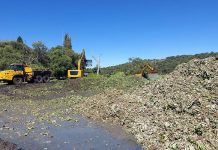SA is responsible for 30% of Africa’s carbon emissions, and uses more energy than any country in the world to produce products. Africa is only responsible for 3% of the worlds’ greenhouse gas emissions, but will bear the worst consequences because it’s least equipped to deal with climate change.
Climate change has had unintended consequences but how stupid could we be? We take carbon that’s been trapped from our atmosphere into the earth over millions of years, decide to use it in a hundred years, and believe it will be harmless. If the Greenland ice sheet melts as scientists expect, sea levels will rise by 7m. The Cape Flats will be under water. We’ll likely be able to protect cities like Cape Town and Durban, but not people living on the coast or the rest of Africa.
Even if the planet stops using fossil fuels tomorrow, today’s emissions will only start affecting us in 10 years’ time. SA’s culpability As a developing nation, SA can argue that we contribute very little to climate change, so we don’t have to do anything about it, but the solution must be global. The US can’t sit on the sidelines, and SA has to lower emissions to leverage them to do the same. Because we’re a coal-based economy, SA’s carbon emissions are also very high.
SA produces nearly 10t of carbon dioxide (CO2) per capita per year, while the world average is at nearly 7t. We’re even way above China (4t/capita), usually viewed as a huge contributor. Sasol is the largest single source of greenhouse gases in the world. The energy industry is responsible for 58% of emissions. In the current energy crisis, power stations are run at full capacity day and night. Plants don’t shut down if air pollution filters break. Agriculture is responsible for over-intensive farming practices, which release carbon from the soil, and enteric fermentation, which is a nice way of saying cattle farts.
Transport produces 15% of emissions, while organic waste in landfills produces methane, a greenhouse gas 23 times more powerful than CO2. ut the real issue is energy. How much energy do we use to produce a product in SA? The world average is just over 500t of CO2 per US million. SA is at about 750t of CO2 per US million. We’ve abused cheap electricity to become one of the world’s most energy-inefficient countries. The obvious response is to increase the price of electricity, but of course that’s not acceptable.
Since 1995, despite warnings from scientists, we’ve increased our greenhouse gas emissions way above the worst-case scenario then proposed. We have to make changes now. Every year we don’t decrease our emissions makes it more difficult to stabilise global concentrations, and stabilising only means we’ll accept a global temperature increase of 2ºC. Ice sheets will keep on melting and we’ll still have extreme weather events – but they’ll be manageable. Finding solutions We have to decrease our emissions by 60% to 80%. As a developing nation we may be able to negotiate a 30% to 40% decrease in our greenhouse gas emissions.
At the DEAT, we modelled a scenario to see what would happen if we continued our practices, even if the rest of the world reduced their emissions. We found that we would increase our local emissions nearly four-fold to 1,6 billion tons of CO2 by 2050. Government programmes that are already in place, such as renewable energy targets and industry energy efficiency, would only reduce this about 1,5 billion tons. We have to peak, plateau and then ease our emissions, and a carbon tax is the most effective way to do this.
Finance minister Trevor Manuel actually announced the carbon tax in his budget speech and nobody noticed – 2c/kWh on electricity from non-renewable resources, or R20/t of carbon. For the DEAT’s model, we started at R100/t, up to R350/t by 2020 and R750/t by 2035. ut this energy crisis is also probably one of the best things that could have happened. Three years ago, electricity was never considered dinner table conversation. People are actually starting to think laterally about how they can save electricity. The bottom line is not to save Eskom, it’s to save the planet. – David Steynberg |fw








